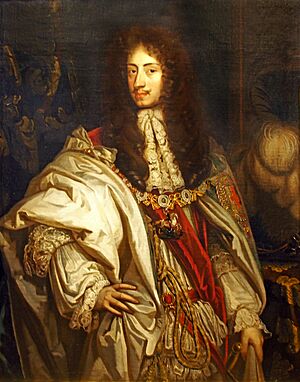Charles II, Elector Palatine facts for kids
Quick facts for kids Charles II |
|
|---|---|

Portrait by Willem Wissing, c. 1680
|
|
| Elector Palatine | |
| Reign | 28 August 1680 – 26 May 1685 |
| Predecessor | Charles I Louis |
| Successor | Philip William |
| Born | 10 April 1651 (O.S.: 31 March 1651) Heidelberg |
| Died | 26 May 1685 (aged 34) Heidelberg |
| Burial | Church of the Holy Spirit, Heidelberg |
| Spouse | Princess Wilhelmina Ernestine of Denmark |
| House | Palatine Simmern |
| Father | Charles I Louis, Elector Palatine |
| Mother | Charlotte of Hesse-Kassel |
| Religion | Protestant |
Charles II (German: Karl II.) was an important ruler known as the Elector Palatine from 1680 to 1685. He was born in Heidelberg on April 10, 1651, and passed away there on May 26, 1685. Charles was the son of Charles I Louis, Elector Palatine, who was also an Elector Palatine, and Charlotte of Hesse-Kassel. His family belonged to the House of Palatine Simmern.
Early Life
Charles's parents had a difficult marriage and separated. His mother moved away to Kassel. Because of this, Charles grew up without his mother, under the strict eye of his father.
His younger sister, Elizabeth Charlotte, who was often called "Liselotte," married King Louis XIV of France's brother, Philippe I, Duke of Orléans, in 1671.
Important scholars named Samuel von Pufendorf and Ezekiel Spanheim were in charge of Charles's education. In 1670, Charles went on a special trip, common for young nobles, to Switzerland and France. While in Switzerland, he became sick with smallpox. This illness left his face permanently scarred.
In 1671, Charles married Princess Wilhelmine Ernestine of Denmark in Heidelberg. His aunt, Sophia of Hanover, helped arrange the marriage. Wilhelmine was the daughter of King Frederick III of Denmark. Charles's marriage was not very happy and they did not have any children.
His Time as Ruler
Charles II's time as Elector Palatine was quite short and not very successful. He made his former teacher, Paul Hachenberg, his main minister. This upset his half-siblings, who were known as the "Raugraves." Charles also brought his mother back from Kassel and paid off her very large debts.
Charles was known to be a bit shy and easily worried. These traits were likely shaped by his childhood experiences. He seemed to enjoy military life, but only in a superficial way. Charles was a very strict Calvinist, which is a type of Protestant faith. After his first minister died, a court preacher named Johann Ludwig Langhanns took over.
The state's money problems grew worse during Charles's rule. This was because he spent too much on his household, his love for hunting, and expensive theater shows, as well as military costs. He could not fix these problems by simply raising taxes. In 1682, Charles even had to give Germersheim to France for twenty years to get money. He loved to put on expensive plays that looked like real battles, with sieges and ships. In just a few years, he spent all the money his father had carefully saved.
Charles was the last Elector of the Palatinate from the Protestant Reformed House of Palatine-Simmern. When he died, the Electoral Palatinate went to a different branch of the family, the Catholic Palatinate-Neuburg line. Charles's sister, Elizabeth Charlotte, who was the Duchess of Orleans and King Louis XIV of France's sister-in-law, claimed she had a right to the Palatinate. This claim was used as an excuse for France to invade the Palatinate in 1688. This invasion started a big conflict known as the Nine Years' War.
 | Aaron Henry |
 | T. R. M. Howard |
 | Jesse Jackson |

